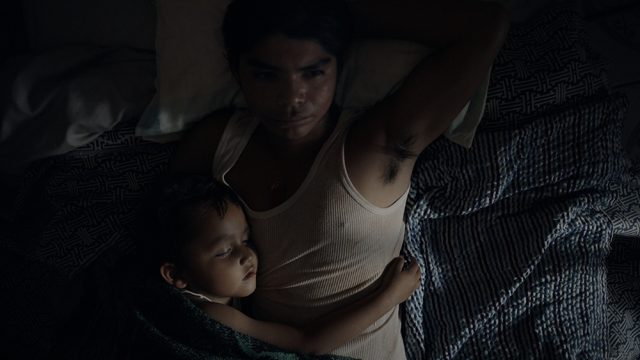The winner of the World Dramatic competition at Sundance, co-directors Astrid Rondero and Fernanda Valadez’s understated and essential Mexican drama “Sujo” is one of two films in this year’s lineup (the other being “Ponyboi”) in which children who were given distinctive names by doomed macho dads spend years wondering what those monikers mean. In both cases, the eventual reveal puts a poignant coda on stories of young Latinos struggling to escape the cycle of ignorance and unhealthy behavior that threatens to pull them under.
An optimistic entry in a traditionally brutal genre, “Sujo” is a story about defying gravity. Like Sleeping Beauty — who manages to prick her finger, even after all of the spinning wheels in the kingdom were thought destroyed — or tragic figures from Greek mythology whose fates are dictated by the gods, the title character seems doomed to follow in the footsteps of his father, Josue (Juan Jesús Varela Hernández), a sicario killed by the cartel for which he worked.
Rondero and Valadez (who collaborated on 2020 Sundance breakout “Identifying Features”) approach the sensationalistic topic of the Mexican drug wars with an art-house sensibility, stripping away the illicit glamour that accompanies more action-oriented south-of-the-border thrillers, like “Miss Bala” or “Sicario.” If anything, it’s more like Richard Linklater’s “Boyhood,” as the filmmakers check in on Sujo (played by two actors) over the years. First, they introduce his father as a child, still innocent enough to imagine whatever kind of life he wanted for himself. Young Josue marvels at the sight of a wild horse, a gorgeous animal that comes to represent a kind of freedom he will never know, but which Josue’s son may someday achieve, if only the boy can avoid the pitfalls that surround him.
In an unsettling early scene, Sujo (Kevin Uriel Aguilar Luna) sits in the backseat while his father handles his business, which, on this particular occasion, means making someone disappear. Locked in the car, the oblivious boy doesn’t understand what’s happening, but audiences will, which makes this dark variation on a “take your son to work day” uniquely chilling. How can the child possibly forge a path for himself if his own father — his strongest role model and a tender presence at home — normalizes this kind of activity from such an impressionable age?
The filmmakers present this memory from Sujo’s perspective: Bored at first, then anxious and uncomprehending when Josue (known as “Ocho,” according to his place in the cartel hierarchy) doesn’t return for hours, he sits in the car for hours until an old man happens to pass by. What if that had been the last time Sujo saw his father?
Rondero and Valadez resist depicting violence outright — which may disappoint those hoping for a more conventional thriller — though it lurks like some kind of bloodthirsty carnivore, licking its jaws just off-screen for most of the picture. Their script provides just enough information to put the pieces together, suggesting what Josue did to seal his own fate (he killed the son of the local cartel boss) as well as the threat that Sujo is destined to wind up “in the same barrel” where they’ve stuffed his dad’s body.
When the local drug lord comes looking for Sujo, DP Ximena Amann crouches under the kitchen table with the boy, who can’t possibly know the stakes of this particular game of hide and seek. Or maybe he does: Sujo wets himself in that moment. Fortunately for the child, Josue’s sorceress-like sister Nemesia (Yadira Pérez Esteban), who lives in a hut outside town without floors or electricity, steps in to raise her orphaned nephew.
From this point forward, the movie cycles through the key influences in the life of Sujo (played as a young man by Juan Jesús Varela), some of whom — like cousins Jai (Alexis Jassiel Varela) and Jeremy (Jairo Hernandez Ramirez), who joins the cartel — pull him back toward temptation. Others, such as the big-city teacher, Susan (Sandra Lorenzano), who sees a different kind of potential in the boy, encourage him to find another path.
Narratively speaking, the story is most exciting when the risks to Sujo are greatest. But the moments that stick with you in the days and weeks afterward are the quiet ones: glimpses into the life of a kid plucked from a macho culture and raised in secret. Deprived of a father figure, Sujo is forced to define his own masculinity, and teased when he reaches Mexico City by the tough guys at an outdoor boxing gym.
Somehow, Jai manages to track him down, and suddenly, whatever progress Sujo has made toward a new life (which includes enrolling in Susan’s class) could be wiped out by the wrong decision. In “Sujo,” it’s not enough to escape the lure of the cartels; someone in his position must consciously move away from that world with every choice. When the explanation of Sujo’s name finally comes, there’s a tragic irony to its significance, and the fact Sujo will never learn what we do about its origins. The father who christened him is gone, but it’s clear from that scene he wanted his boy to be free.






















